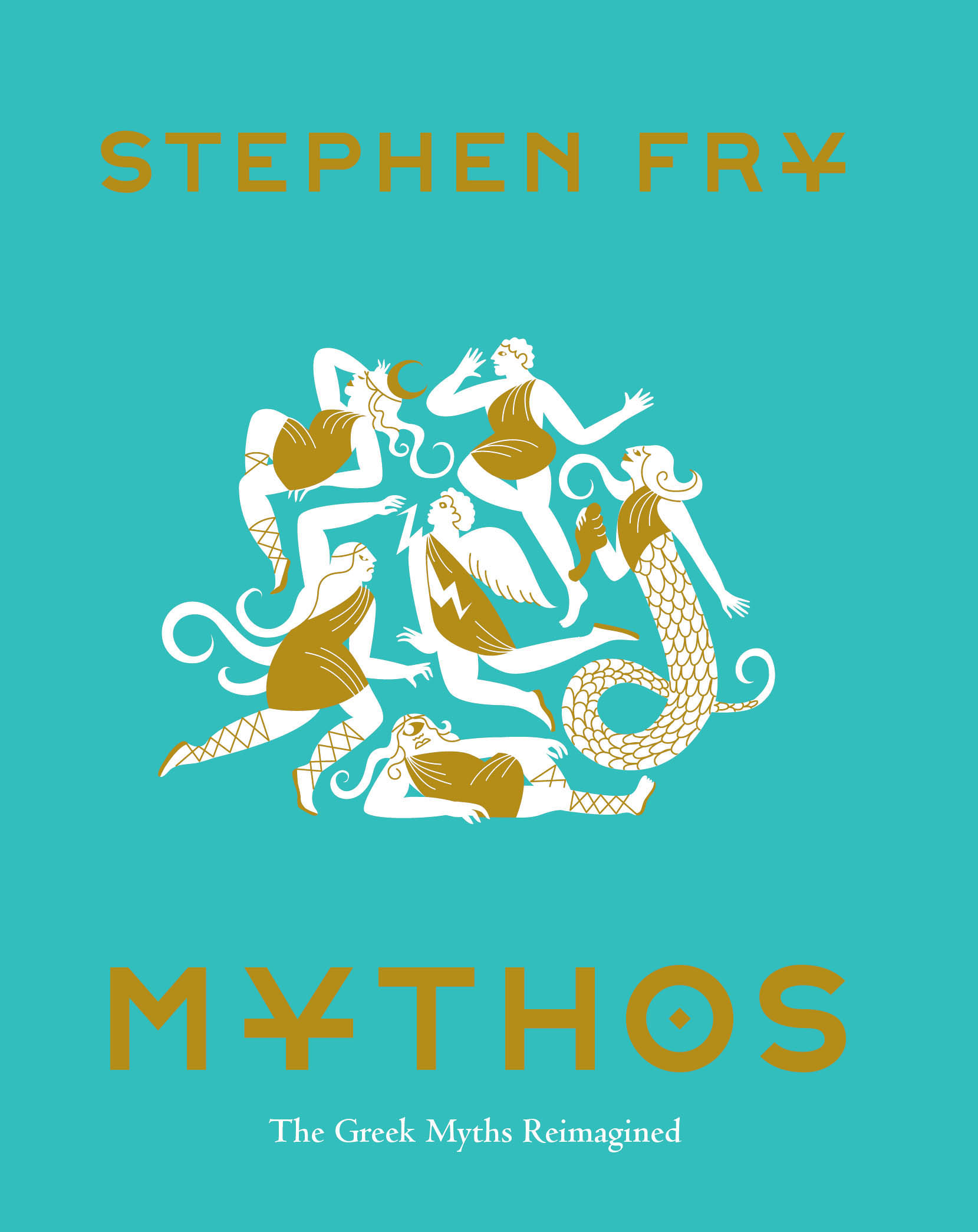


Text copyright 2017 by Stephen Fry.
Art copyright 2017 by the individual licensors.
are continuations of the copyright page.
All rights reserved. No part of this book may be reproduced in any form without written permission from the publisher.
First published in the United States of America in 2019 by Chronicle Books.
Originally published in the United Kingdom in 2017 by Michael Joseph.
ISBN 978-1-4521-7904-9 (epub, mobi)
Library of Congress Cataloging-in-Publication Data available.
ISBN 978-1-4521-7891-2 (hardcover: alk. paper)
Design by Maggie Edelman.
Cover illustrations by Karolina Schnoor.
Chronicle books and gifts are available at special quantity discounts to corporations, professional associations, literacy programs, and other organizations. For details and discount information, please contact our premiums department at or at 1-800-759-0190.
Chronicle Books LLC
680 Second Street
San Francisco, California 94107
www.chroniclebooks.com
CONTENTS
FOREWORD
I was lucky enough to pick up a book called Tales from Ancient Greece when I was quite small. It was love at first meeting. Much as I went on to enjoy myths and legends from other cultures and peoples, there was something about these Greek stories that lit me up inside. The energy, humor, passion, particularity, and believable detail of their world held me enthralled from the very first. I hope they will do the same for you. Perhaps you already know some of the myths told here, but I especially welcome those who may never have encountered the characters and stories of Greek myth before. You dont need to know anything to read this book; it starts with an empty universe. Certainly no classical education is called for, no knowledge of the difference between nectar and nymphs, satyrs and centaurs, or the Fates and the Furies is required. There is absolutely nothing academic or intellectual about Greek mythology; it is addictive, entertaining, approachable, and astonishingly human.
But where did they come from, these myths of ancient Greece? In the tangle of human history we may be able to pull on a single Greek thread and follow it back, but by picking out only one civilization and its stories we might be thought of as taking liberties with the true source of universal myth. Early human beings the world over wondered at the sources of power that fueled volcanoes, thunderstorms, tidal waves, and earthquakes. They celebrated and venerated the rhythm of the seasons, the procession of heavenly bodies in the night sky, and the daily miracle of the sunrise. They questioned how it might all have started. The collective unconscious of many civilizations has told stories of angry gods; dying and renewing gods; fertility goddesses; deities; demons; and spirits of fire, earth, and water.
Of course the Greeks were not the only people to weave a tapestry of legends and lore out of the puzzling fabric of existence. The gods of Greece, if we are archaeological and palaeoanthropological about it all, can be traced back to the sky fathers, moon goddesses, and demons of the fertile crescent of Mesopotamiatodays Iraq, Syria, and Turkey. The Babylonians, Sumerians, Akkadians, and other civilizations there, which first flourished far earlier than the Greeks, had their creation stories and folk myths which, like the languages that expressed them, could find ancestry in India and thence westward back to prehistory, Africa, and the birth of our species.
But whenever we tell any story we have to snip the narrative string somewhere in order to make a starting point. It is easy to do this with Greek mythology because it has survived with a detail, richness, life, and color that distinguish it from other mythologies. It was captured and preserved by the very first poets and has come down to us in an unbroken line from almost the beginning of writing to the present day. While Greek myths have much in common with Chinese, Iranian, Indian, Mayan, African, Russian, Native American, Hebrew, and Norse myths, they are uniquelyas the writer and mythographer Edith Hamilton put itthe creation of great poets. The Greeks were the first people to make coherent narratives, a literature even, of their gods, monsters, and heroes.
The arc of the Greek myths follows the rise of mankind, our battle to free ourselves from the interference of the godstheir abuse, their meddling, their tyranny over human life and civilization. Greeks did not grovel before their gods. They were aware of their vain need to be supplicated and venerated, but they believed men were their equal. Their myths understand that whoever created this baffling world, with its cruelties, wonders, caprices, beauties, madness, and injustice, must themselves have been cruel, wonderful, capricious, beautiful, mad, and unjust. The Greeks created gods that were in their image: warlike but creative, wise but ferocious, loving but jealous, tender but brutal, compassionate but vengeful.
Mythos begins at the beginning, but it does not end at the end. Had I included heroes like Oedipus, Perseus, Theseus, Jason, and Heracles and the details of the Trojan War, this book would have been too heavy even for a Titan to pick up. Moreover, I am only concerned with telling the stories, not with explaining them or investigating the human truths and psychological insights that may lie behind them. The myths are fascinating enough in all their disturbing, surprising, romantic, comic, tragic, violent, and enchanting detail to stand on their own as stories. If, as you read, you cannot help wondering what inspired the Greeks to invent a world so rich and elaborate in character and incident, and you find yourself pondering the deep truths that the myths embodywell, that is certainly part of the pleasure.
And pleasure is what immersing yourself in the world of Greek myth is all about.
Stephen Fry
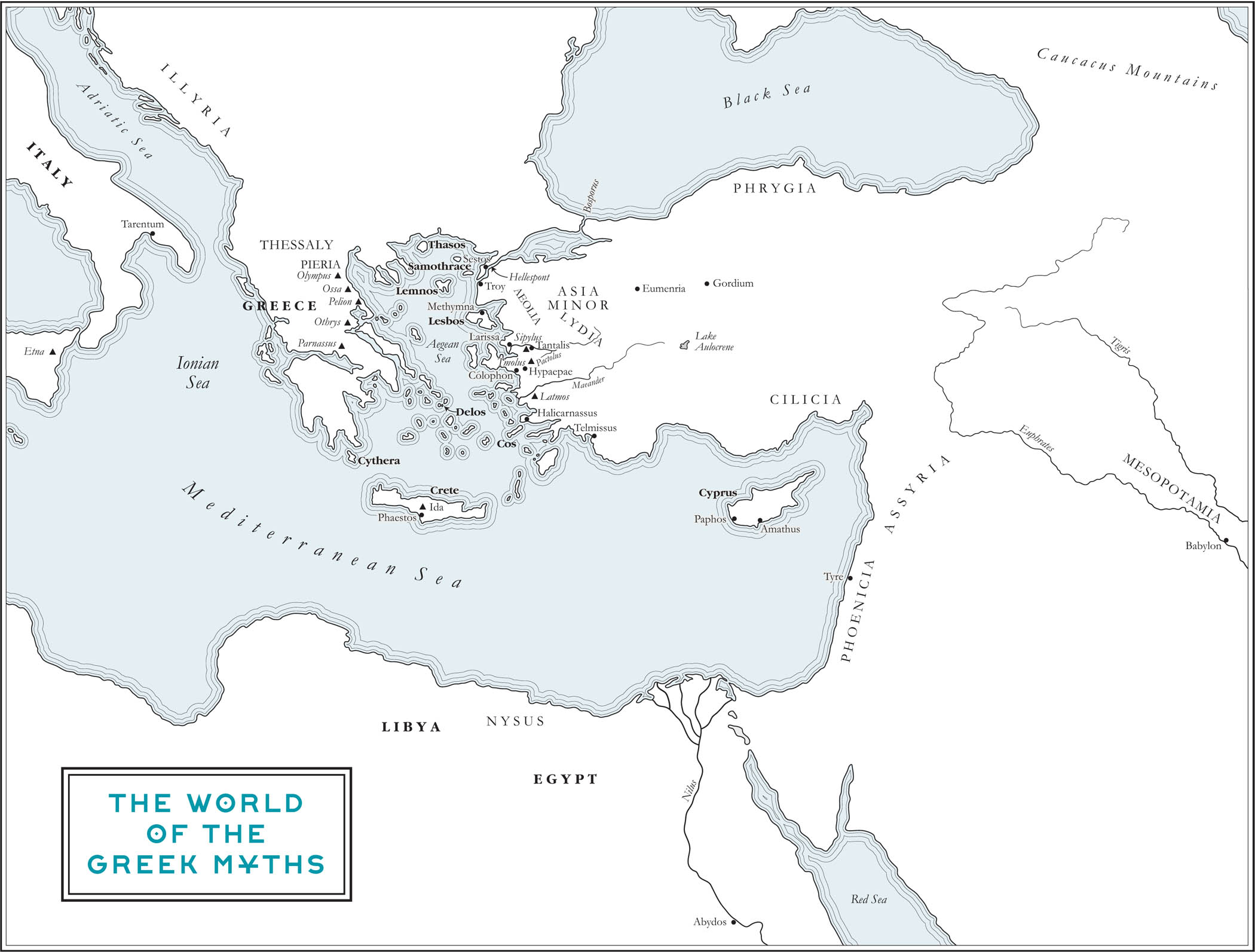
The Second Order
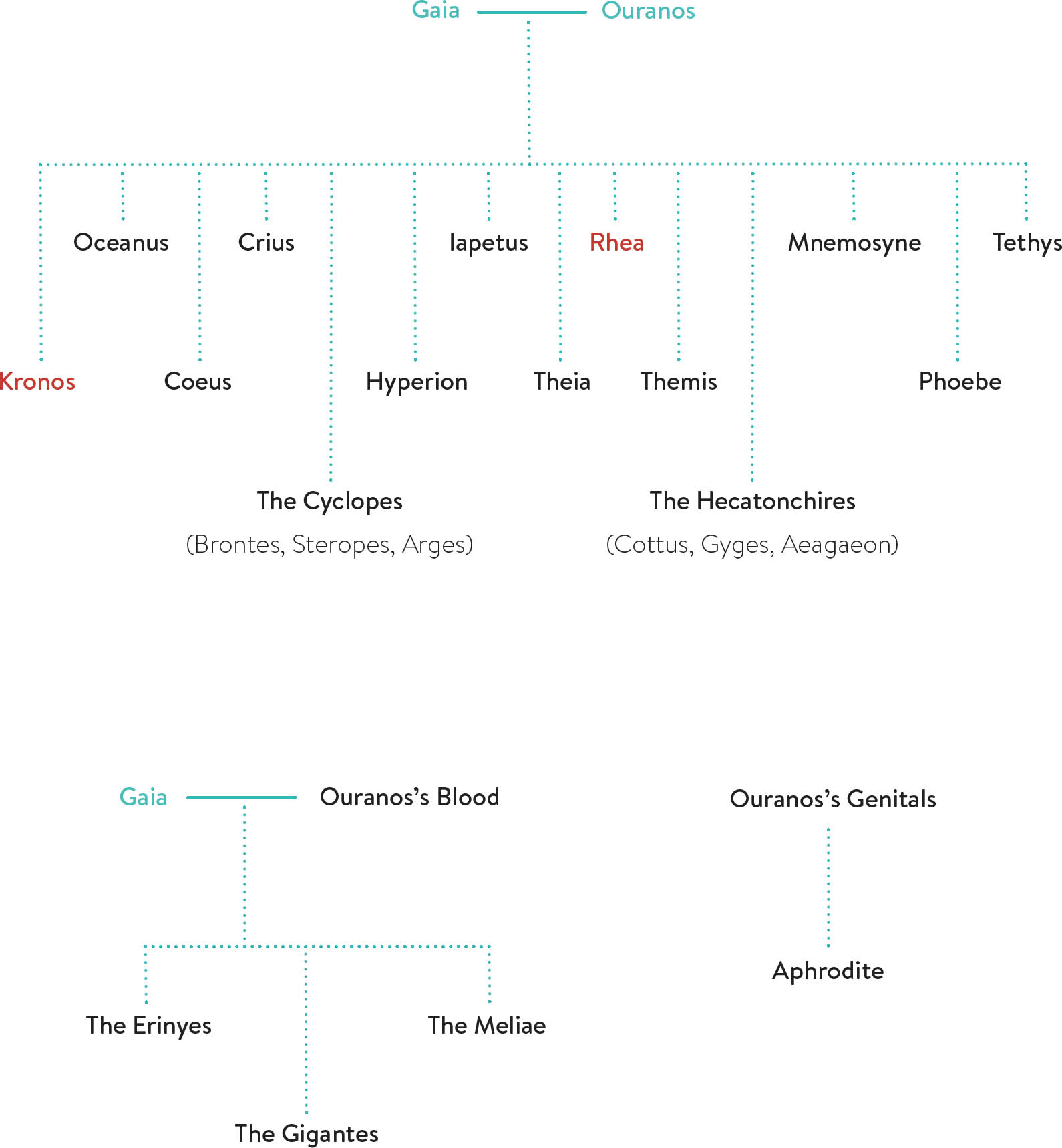
The Olympians
Hades is not technically an Olympian, as he spent all of his time in the underworld.

THE BEGINNING

Part One

OUT OF CHAOS
These days the origin of the universe is explained by proposing a Big Bang, a single event that instantly brought into being all the matter from which everything and everyone are made.
The ancient Greeks had a different idea. They said that it all started not with a bang, but with CHAOS.
Was Chaos a goda divine beingor simply a state of nothingness? Or was Chaos, just as we would use the word today, a kind of terrible mess, like a teenagers bedroom only worse?
Next page

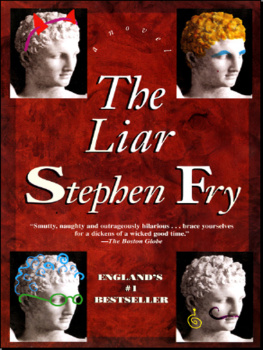
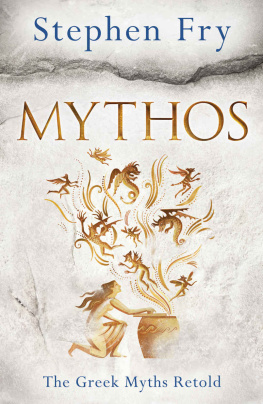
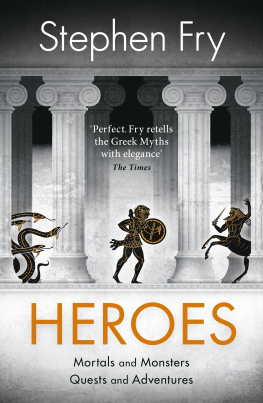



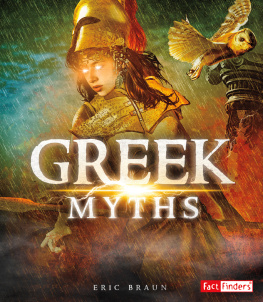
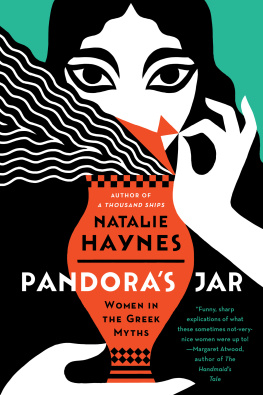

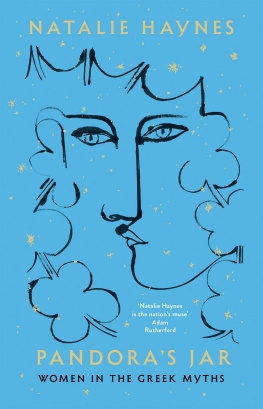

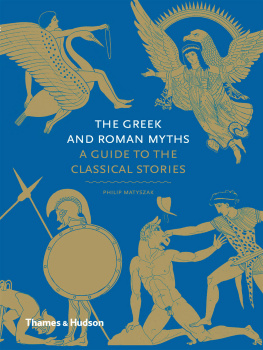
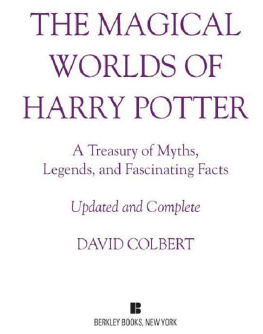
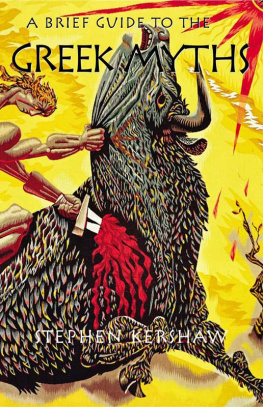
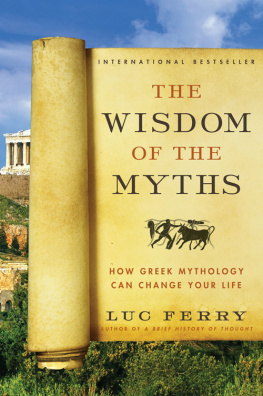
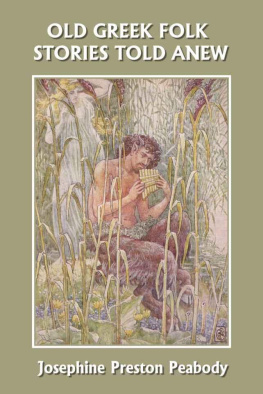






 Part One
Part One